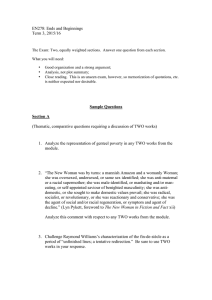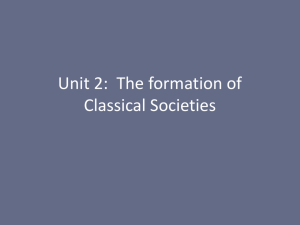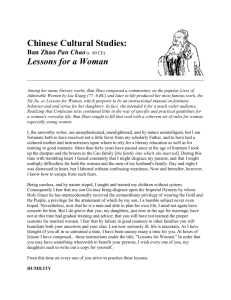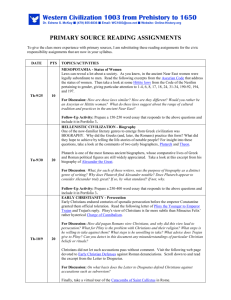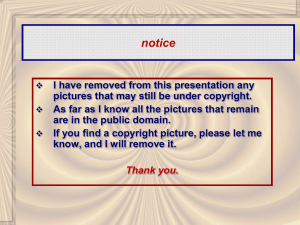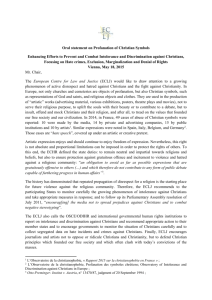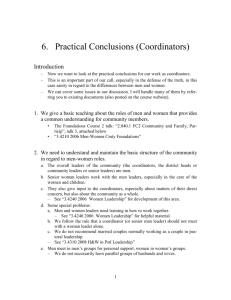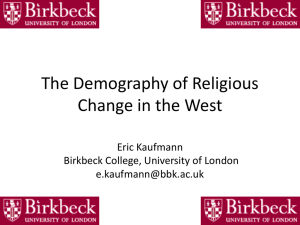Rome Document Quiz
advertisement
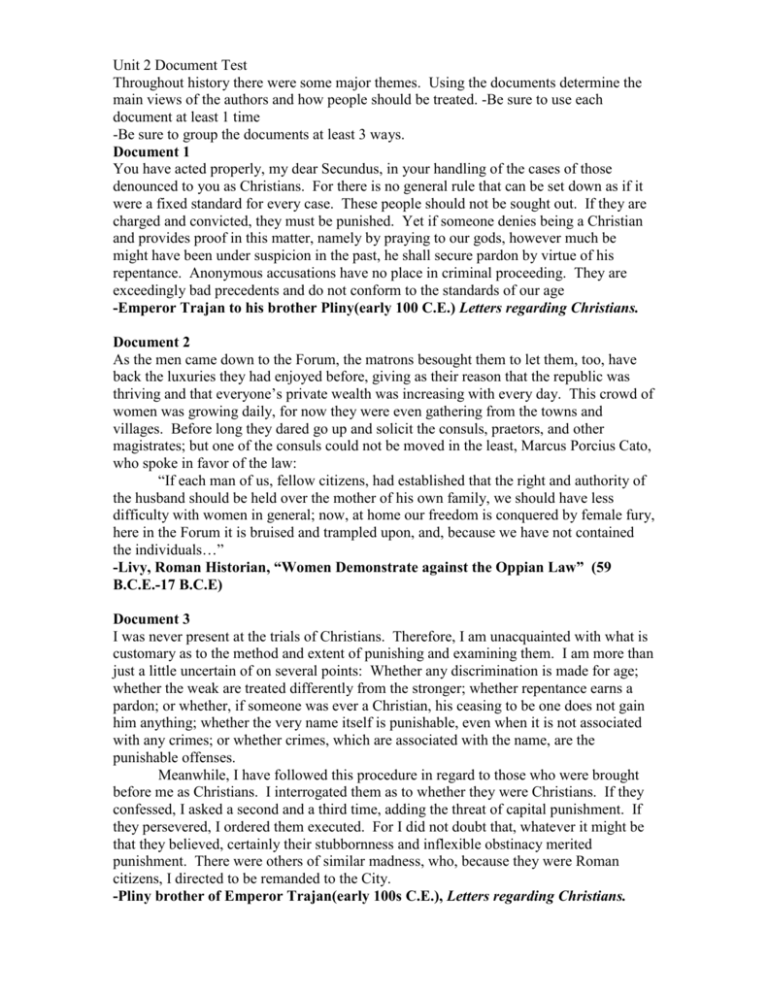
Unit 2 Document Test Throughout history there were some major themes. Using the documents determine the main views of the authors and how people should be treated. -Be sure to use each document at least 1 time -Be sure to group the documents at least 3 ways. Document 1 You have acted properly, my dear Secundus, in your handling of the cases of those denounced to you as Christians. For there is no general rule that can be set down as if it were a fixed standard for every case. These people should not be sought out. If they are charged and convicted, they must be punished. Yet if someone denies being a Christian and provides proof in this matter, namely by praying to our gods, however much be might have been under suspicion in the past, he shall secure pardon by virtue of his repentance. Anonymous accusations have no place in criminal proceeding. They are exceedingly bad precedents and do not conform to the standards of our age -Emperor Trajan to his brother Pliny(early 100 C.E.) Letters regarding Christians. Document 2 As the men came down to the Forum, the matrons besought them to let them, too, have back the luxuries they had enjoyed before, giving as their reason that the republic was thriving and that everyone’s private wealth was increasing with every day. This crowd of women was growing daily, for now they were even gathering from the towns and villages. Before long they dared go up and solicit the consuls, praetors, and other magistrates; but one of the consuls could not be moved in the least, Marcus Porcius Cato, who spoke in favor of the law: “If each man of us, fellow citizens, had established that the right and authority of the husband should be held over the mother of his own family, we should have less difficulty with women in general; now, at home our freedom is conquered by female fury, here in the Forum it is bruised and trampled upon, and, because we have not contained the individuals…” -Livy, Roman Historian, “Women Demonstrate against the Oppian Law” (59 B.C.E.-17 B.C.E) Document 3 I was never present at the trials of Christians. Therefore, I am unacquainted with what is customary as to the method and extent of punishing and examining them. I am more than just a little uncertain of on several points: Whether any discrimination is made for age; whether the weak are treated differently from the stronger; whether repentance earns a pardon; or whether, if someone was ever a Christian, his ceasing to be one does not gain him anything; whether the very name itself is punishable, even when it is not associated with any crimes; or whether crimes, which are associated with the name, are the punishable offenses. Meanwhile, I have followed this procedure in regard to those who were brought before me as Christians. I interrogated them as to whether they were Christians. If they confessed, I asked a second and a third time, adding the threat of capital punishment. If they persevered, I ordered them executed. For I did not doubt that, whatever it might be that they believed, certainly their stubbornness and inflexible obstinacy merited punishment. There were others of similar madness, who, because they were Roman citizens, I directed to be remanded to the City. -Pliny brother of Emperor Trajan(early 100s C.E.), Letters regarding Christians. Document 4 It was out of the association formed by men with these two, women and slaves, that the first household was formed; and the poet Hesiod was right when he wrote, “Get first a house and a wife and an ox draw the plough.” This association of persons, established according to the law of nature and continuing day after day, is the household… The “slave by nature” then is he that can and therefore does belong to another, and he that participates in the reasoning faculty so far as to understand but not so as to possess it. For the other animals serve their owner not by exercise of reason but passively. The use, too, of slaves hardly differs at all from that of domestic animals; from both we derive that which is essential for our bodily needs…It is clear then that in household management the people are of greater importance than the material property, and their quality of more account than that of the goods that make up their wealth, and also that free men are of more account than slaves. -Aristotle, Politics Document 5 A woman ought to have four qualifications: 1) womanly virtues; 2) womanly words; 3) womanly bearing; and 4) womanly work. Now what is called womanly virtue need not be brilliant ability, exceptionally different from others. Womanly words need be neither clever in debate nor keen in conversation. Womanly appearance requires neither a pretty nor a perfect face and form. Womanly work need not be work done more skillfully than that of others… To choose her words with care; to avoid vulgar language; to respect at appropriate times; and not to weary others with much conversation, may be called the characteristics of womanly words. -Lessons for Women: Ban Zhao Document 6 Now it is said that they have the custom, that if a child falls sick, it is taken around by its mother to each of the houses to see if anyone knows of a proven remedy to apply to the illness. And when one of the women has brought her child around to everyone, according to custom, and has found no remedy in any of the houses, she went to the woman captive as well to see if she knew anything. She answered that she knew of no human remedy, but declared that Christ her God, whom she worshiped, could give it the healing despaired of by humans. And after she had put the child on her hair shirt and poured out above it her prayer to the Lord, she gave the infant back to its mother in good health. Word of this got around to many people, and news of the wonderful deed reached the ears of the queen, who was suffering from a bodily illness of the gravest sort and has been reduced to a state of solute despair. She asked for the woman captive to be brought to her. She declined to go, lest she appear to pretend to more than was proper to her sex. -Tyrannius Rufinus(345 C.E.) historian from the Eastern Mediterranean, Church History
